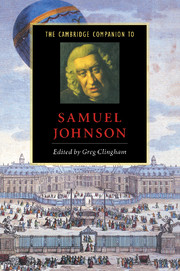Book contents
- Frontmatter
- Introduction
- 1 Extraordinarily ordinary
- 2 Johnson and the arts of conversation
- 3 Johnson's poetry
- 4 Johnson, the essay, and The Rambler
- 5 Johnson and the condition of women
- 6 Johnson's Dictionary
- 7 Johnson's politics
- 8 Johnson and imperialism
- 9 The skepticism of Johnson's Rasselas
- 10 Shakespeare
- 11 Life and literature in Johnson's Lives of the Poets
- 12 Johnson's Christian thought
- 13 “From China to Peru”
- 14 “Letters about nothing”
- 15 Johnson's critical reception
- Further reading
- Index
9 - The skepticism of Johnson's Rasselas
Published online by Cambridge University Press: 28 May 2006
- Frontmatter
- Introduction
- 1 Extraordinarily ordinary
- 2 Johnson and the arts of conversation
- 3 Johnson's poetry
- 4 Johnson, the essay, and The Rambler
- 5 Johnson and the condition of women
- 6 Johnson's Dictionary
- 7 Johnson's politics
- 8 Johnson and imperialism
- 9 The skepticism of Johnson's Rasselas
- 10 Shakespeare
- 11 Life and literature in Johnson's Lives of the Poets
- 12 Johnson's Christian thought
- 13 “From China to Peru”
- 14 “Letters about nothing”
- 15 Johnson's critical reception
- Further reading
- Index
Summary
Rasselas was written and published in 1759, and immediately became a popular work, running to several editions in the course of Johnson's lifetime and being frequently reprinted thereafter. It is still the best known of any of Johnson's works, and is probably the best place to start for anyone coming to Johnson for the first time. It is short, for one thing, saying much in relatively few pages. It deals with a self-evidently large and interesting subject - Johnson thought of titling it “The Choice of Life” - and does so without reference to intellectual or historical matters now become obscure. It has the congenial form of a narrative fiction, and although it is unlike what the modern reader would think of as a novel, the narrative form remains essential to its effect: the unwinding line of the story and the contingency of event play against the discursive, intellectualizing impulse in a way that releases some of Johnson's best writing, here as in the Lives of the Poets. And, perhaps more unmistakably than any of his other works, Rasselas impresses with the power of Johnson's intelligence, the “strength of thought” which, as he says in the “Life of Cowley,” is essential to any account of true wit (Lives, 1, 19-2,0).
- Type
- Chapter
- Information
- The Cambridge Companion to Samuel Johnson , pp. 127 - 142Publisher: Cambridge University PressPrint publication year: 1997
- 1
- Cited by



